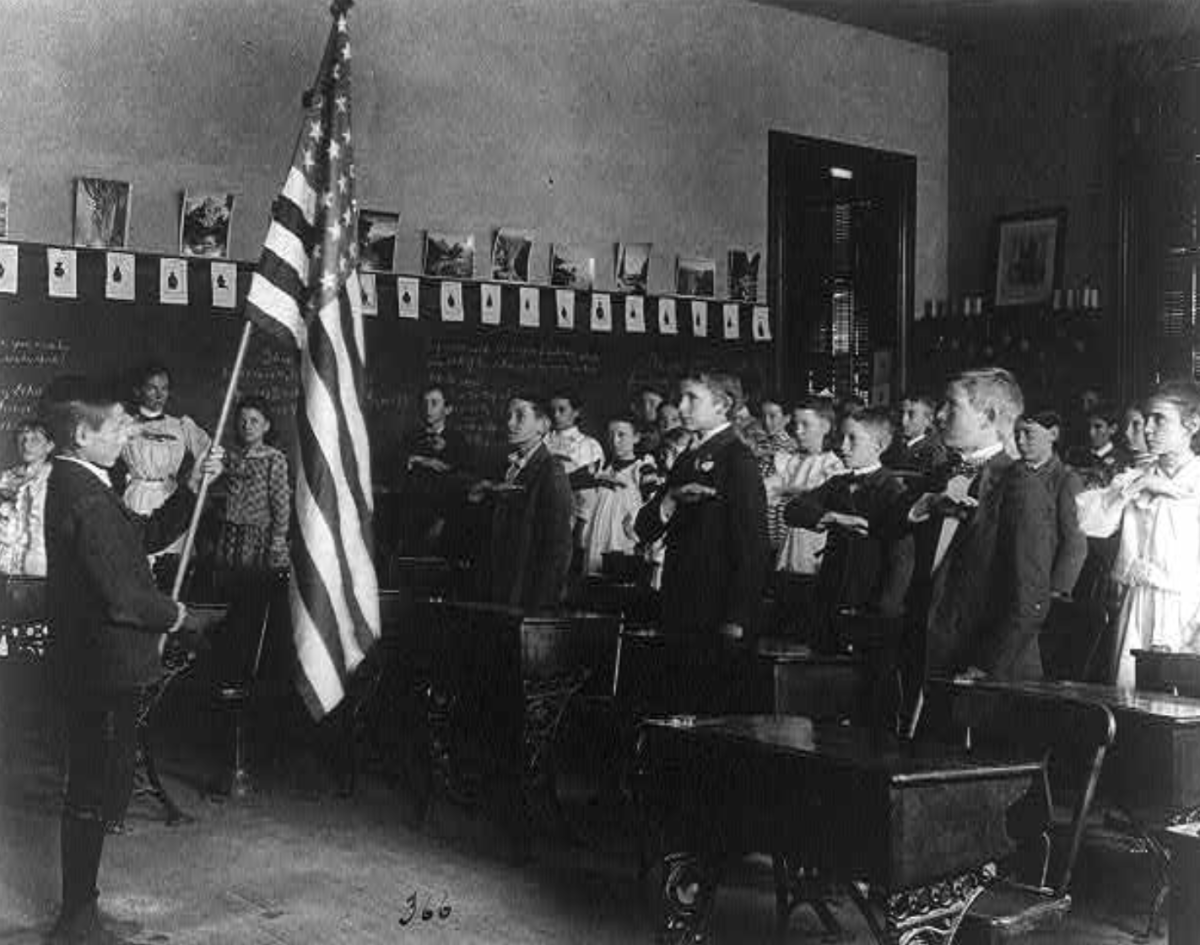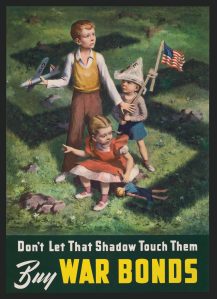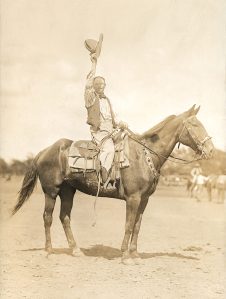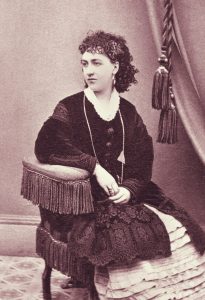i pledge allegiance to what, now?
One of the most momentous cases on the Supreme Court docket as war raged globally in 1943 was about a single sentence said aloud by schoolchildren every day. They stood, held their right hands over their hearts or in a raised-arm salute and began, “I pledge allegiance to the flag…” To most Americans the pledge was a solemn affirmation of national unity, especially at a time when millions of U.S. troops were fighting overseas. But the Jehovah’s Witnesses, a religious sect renowned for descending en masse on small towns or city neighborhoods and calling on members of other faiths to “awake” and escape the snare of the devil and his minions, felt otherwise. They insisted that pledging allegiance to the flag was a form of idolatry akin to the worship of graven images prohibited by the Bible. In West Virginia State Board of Education v. Barnette, Walter Barnett (whose surname was misspelled by a court clerk) argued that the constitutional rights of his daughters Marie, 8, and Gathie, 9, were violated when they were expelled from Slip Hill Grade School near Charleston, W.Va., for refusing to recite the pledge.
In a landmark decision written by Justice Robert Jackson and announced on Flag Day, June 14, the Supreme Court sided with the Witnesses. “To believe that patriotism will not flourish if patriotic ceremonies are voluntary and spontaneous instead of a compulsory routine is to make an unflattering estimate of the appeal of our institutions to free minds,” Jackson said. “If there is any fixed star in our constitutional constellation, it is that no official, high or petty, can prescribe what shall be orthodox in politics, nationalism, religion, or other matters of opinion or force citizens to confess by word or act their faith therein.”
Jehovah’s Witnesses were unlikely champions of religious freedom. The sect’s leaders denounced all other religions and all secular governments as tools of the devil, and preached the imminence of the Apocalypse, during which no one except Jehovah’s Witnesses would be spared. But their persistence in fighting in the courts for their beliefs had a dramatic impact on constitutional law. Barnette is just one of several major Supreme Court decisions involving freedom of religion, speech, assembly and conscience that arose from clashes between Jehovah’s Witnesses and government authorities. The Witnesses insisted that God’s law demanded they refrain from all pledges of allegiance to earthly governments. They tested the nation’s tolerance of controversial beliefs and led to an increasing recognition that a willingness to embrace religious diversity is what distinguishes America from tyrannical regimes.
how did the jehovah’s witness sect start?
The Witness sect was founded in the 1870s, and caused a stir when the founder, Charles Taze Russell, a haberdasher in Pittsburgh, predicted the world would come to an end in 1914. Russell died in 1916; he was succeeded by his lawyer Joseph Franklin Rutherford, who shrewdly emphasized that the Apocalypse was near, but not so near that Witnesses didn’t have time to convert new followers, which they were required to do lest they miss out on salvation. This “blood guilt” propelled in-your-face proselytizing by Witnesses in various communities on street corners and in door-to-door visits. Soon the sect developed a reputation for exhibiting “astonishing powers of annoyance,” as one legal commentator put it.
Rutherford ruled the Witnesses with an iron fist. He routinely encouraged public displays of contempt for “Satan’s world,” which included all other religions and all secular governments. At the time, the number of Witnesses in the U.S.—roughly 40,000—was so small that many Americans could ignore them. But in Nazi Germany, no group was too small to escape the eye of new chancellor Adolf Hitler, who banned the Witnesses after they refused to show their fealty to him with the mandatory “Heil Hitler” raised-arm salute. (Many Witnesses would later perish in his death camps.) In response, Rutherford praised the German Witnesses and advised all of his followers to refuse to participate in any oaths of allegiance that violated (in his view) the Second Commandment: “Thou shall have no Gods before me.”
With conflict looming around the world in the 1930s, many states enacted flag salute requirements, especially in schools. The steadfast refusal of Witnesses to pledge, combined with their refusal to serve in the military or to support America’s war effort in any way, triggered public anger. Witnesses soon became a ubiquitous presence in courtrooms across the country.
The relationship between Witnesses and the courts was complicated, in part because of the open disdain Rutherford and his followers displayed toward all forms of government and organized religion. Rutherford instructed Witnesses not to vote, serve on juries or participate in other civic duties. He even claimed Social Security numbers were the “mark of the beast” foretold in Revelations. The Catholic Church, said Rutherford, was a “racket,” and Protestants and Jews were “great simpletons,” taken in by the Catholic hierarchy to “carry on her commercial, religious traffic and increase her revenues.” Complaints about unwelcome public proselytizing by Witnesses led to frequent run-ins with state and local authorities and hundreds of appearances in lower courts. Every day in court for Rutherford and the Witnesses’ chief attorney, Hayden Covington, was an opportunity to preach the true meaning of law to the judges and to confront the satanic government.
riling up the rust belt
In late 1935, Witness Walter Gobitas’ two children—Lillian, 12, and Billy, 10—were expelled from school in Minersville, Pa., because they balked at the mandatory recital of the Pledge of Allegiance, and a long court battle ensued. When Gobitis v. Minersville School District (as with Barnette, a court clerk misspelled the family surname) made its way to the Supreme Court in the spring of 1940, Rutherford and Covington framed their argument in religious terms, claiming that any statute contrary to God’s law as given to Moses must be void. The Court rejected the Witnesses’ claim, holding that the secular interests of the school district in fostering patriotism were paramount. In the majority opinion, written during the same month that France fell to the Nazis, Felix Frankfurter wrote: “National unity is the basis of national security.” The plaintiffs, said Frankfurter, were free to “fight out the wise use of legislative authority in the forum of public opinion and before legislative assemblies.”
In a strongly worded dissent, Justice Harlan Stone argued that “constitutional guarantees or personal liberty are not always absolutes…but it is a long step, and one which I am unwilling to take, that government may, as a supposed educational measure…compel public affirmations which violate their public conscience.” Further, said Stone, the prospect of help for this “small and helpless minority” by the political process was so remote that Frankfurter had effectively “surrendered…the liberty of small minorities to the popular will.”
Public reaction to Gobitis bordered on hysteria, colored by the hotly debated prospect of American participation in the war in Europe. Some vigilantes interpreted the Supreme Court’s decision as a signal that Jehovah’s Witnesses were traitors who might be linked to a network of Nazi spies and saboteurs. In Imperial, a town outside Pittsburgh, a mob descended on a small group of Witnesses and pummeled them mercilessly. One Witness was beaten unconscious, and those who fled were cornered by ax- and knife-wielding men riding the town’s fire truck as someone yelled, “Get the ropes! Bring the flag!” In Kennebunk, Maine, the Witnesses’ gathering place, Kingdom Hall, was ransacked and torched, and days of rioting ensued. In Litchfield, Ill., an angry crowd spread an American flag on the hood of a car and watched while a man repeatedly smashed the head of a Witness upon it. In Rockville, Md., Witnesses were assaulted across the street from the police station, while officers stood and watched. By the end of the year, the American Civil Liberties Union estimated that 1,500 Witnesses had been assaulted in 335 separate attacks.
The reversal of Gobitis in Barnette just three years later was remarkably swift considering the typical pace of deliberations in the Supreme Court. In the wake of all the violence against Witnesses, three Supreme Court justices—William O. Douglas, Frank Murphy and Hugo Black—publicly signaled in a separate case that they thought Gobitis had been “wrongly decided.” When Barnette reached the Supreme Court in 1943, Harlan Stone, the lone dissenter in Gobitis, had risen to chief justice. The facts of the two cases mirrored each other, but the outcome differed dramatically. Most important, in ruling that Witness children could not be forced to recite the pledge, the new majority rejected the notion that legislatures, rather than the courts, were the proper place to address questions involving religious liberty. The “very purpose” of the Bill of Rights, wrote Justice Robert Jackson, was to protect some issues from the majority rule of politics. “One’s right to life, liberty and property, to free speech, a free press, freedom of worship and assembly, may not be submitted to vote….Fundamental rights depend on the outcome of no elections.” Jackson’s opinion was laced with condemnation of enforced patriotism and oblique hints at the slaughter taking place in Hitler’s Europe. “Those who begin in coercive elimination of dissent soon find themselves exterminating dissenters,” Jackson wrote. “Compulsory unification of opinions achieves only the unanimity of the graveyard.” Religious dissenters, when seen from this perspective, are like the canary in the coal mine: When they begin to suffer and die, everyone should be worried that the atmosphere has been polluted by tyranny.
flag day’s future
Today, the Witnesses still proselytize, but their right to do so is well established thanks to their long legal campaign. Over time they became less confrontational and blended into the fabric of American life.
In the wake of the Barnette decision, the flag and the Pledge of Allegiance continued to occupy a key (yet ambiguous) place in American politics and law. The original pledge was a secular oath, with no reference to any power greater than the United States of America. The phrase “under God” was added by an act of Congress and signed into law by President Dwight Eisenhower on Flag Day, June 14, 1954. Eisenhower, who had grown up in a Jehovah’s Witness household but later became a Presbyterian, alluded to the growing threat posed by Communists in the Soviet Union and China when he signed the bill: “In this way we are reaffirming the transcendence of religious faith in America’s heritage and future; in this way we shall constantly strengthen those spiritual weapons which forever will be our country’s most powerful resources in peace and war.”
Eisenhower’s political instincts for the ways that religion functioned in American life were finely honed: Support for the amendment to the Pledge of Allegiance was strong, including an overwhelming majority of Catholics and Protestants as well as a majority of Jews. According to a Gallup survey, the only group that truly opposed the change was the smattering of atheists. In a country locked in battle with godless communism, a spiritual weapon such as an amended pledge that was not denominationally specific made sense. Only after the intervening half-century and more does the “Judeo-Christian” God invoked in the pledge seem less than broadly inclusive.
Sarah Barringer Gordon is the author of The Spirit of the Law: Religious Voices and the Constitution in Modern America.





